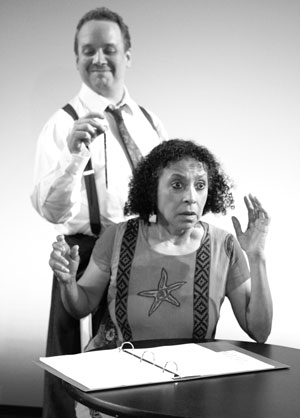
BY SAM SPOKONY |
Ghost story questions perceptions of race, culture in art
CHASING HEAVEN
FringeNYC shows run through Aug. 28, 2pm-midnight weekdays and noon-midnight on weekends. Tickets: $15 in advance at FringeNYC.org or 866-468-7619; $18 at the door. Discount passes for multiple shows. For show dates, times and venue info, visit FringeNYC.org.
It’s appropriate that writer-director Leah Maddrie’s play came to life over the course of this year. “Chasing Heaven,” the fictional, depression-era “Negro folk opera” being remade in her script, is based on Gershwin’s classic “Porgy and Bess” — which will be revived on Broadway this December.
As Maddrie writes in an introductory letter to the program, “We are still not comfortable dealing with American history and race.” She continues, noting that recent developments involving Gershwin’s opus should remind us “now is the time” for the questions this performance poses. She’s right. But the real question, in this case, is how intellectually effective that display can be.
“Chasing Heaven” is the work of Joshua Gerwitz (Greg Horton), who solidified his place in theatre history once his folk opera introduced some of its most popular musical standards. Now, 70 years after its debut (and decades after its writer’s death), the present-day Gerwitz Foundation has commissioned Pulitzer Prize-winner Kinshasa Morton (Christine Campbell) to remake the original.
Soon, Morton’s must confront what some in contemporary American society (especially the African-American community) consider to be Gerwitz’s inherent racism. Morton begins her rewrite by cutting many of the outdated stereotypes — but doesn’t get far before the ghost of Gerwitz returns to tell her to stop ruining his masterpiece.
While several other side characters enter throughout the play (all played by Daniel Carlton and Linda Kuriloff), their appearances are artistically arbitrary — and the real meat of the discussion is always between Morton and Gerwitz’s specter. How important is it to adhere to the political correctness of a culture? Does that need for representational equality outweigh the vision of an original artist, who probably never had the future in mind? These questions dominate each interaction, drawing out new feelings of understanding between Morton and Gerwitz as, coming from two eras and two different poles of artistic thought, they seek to find some middle ground for “Chasing Heaven.”
Maddrie’s presentation of what has now become a real life struggle is thought provoking and engaging — but it stops short of offering anything beyond an introduction to the issues of race, culture and art (which aren’t new to the world of loaded topics). As a result, “Chasing Heaven” never has a chance to make the intellectual mark it could — because essentially, it’s too polite. We never get to see the remake get staged, and the conciliatory ending between Morton and Gerwitz is abrupt and trite. But audiences looking forward to issues of race, culture and art that are sure to surface prior to the opening of “Porgy and Bess” will find this a useful primer.


























